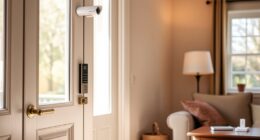To manage seasonal allergies as an older adult, identify common triggers like pollen, dust, and pet dander, and take steps to reduce exposure, such as staying indoors during peak seasons and using air purifiers. Consider safe treatments and herbal supplements after consulting your healthcare provider, and make lifestyle changes like keeping windows closed and maintaining a clean environment. Knowing when to seek medical advice can prevent complications—continue exploring for more tips to keep allergy symptoms in check.
Key Takeaways
- Identify and avoid common allergens like pollen, dust mites, and mold during peak seasons.
- Use air purifiers, keep windows closed, and regularly clean bedding to reduce indoor allergen exposure.
- Consult healthcare providers for age-appropriate medications and explore herbal supplements with professional guidance.
- Wear masks outdoors and limit outdoor activities during high pollen periods to minimize symptom triggers.
- Seek medical advice if symptoms worsen or interfere with daily life, and establish an emergency plan for severe reactions.
Understanding How Aging Affects Allergy Symptoms

As people age, their immune systems undergo changes that can alter how they experience allergy symptoms. One key factor is immune system aging, which can weaken your body’s ability to respond to allergens effectively. This may lead to less obvious or milder allergy reactions compared to younger years. Additionally, your genetic predisposition plays a role; if allergies run in your family, you’re more likely to develop symptoms later in life or notice them more intensely. Aging can also cause your immune response to become unpredictable, sometimes reducing symptoms and other times making them more severe. Understanding these changes helps you recognize that allergy symptoms in seniors might differ from those experienced earlier in life, requiring tailored approaches for management. Moreover, vetted allergy information suggests that the immune system’s responsiveness diminishes with age, impacting allergy severity and presentation. Also, changes in immune system function can influence the types and frequency of allergy symptoms experienced by elderly adults. Furthermore, research indicates that aging-related immune decline can sometimes lead to atypical allergy symptoms, making diagnosis and treatment more complex.
Identifying Common Triggers for Seniors

Many common allergens can trigger seasonal allergy symptoms in seniors, and identifying these triggers is key to managing their condition effectively. Pollen exposure is a major outdoor trigger, especially during peak seasons. Indoor allergens also play a significant role in worsening symptoms. To better understand what affects you, consider these common triggers:
Identifying allergens like pollen, dust mites, mold, and indoor pollutants is key to managing seniors’ allergy symptoms effectively.
- Pollen from trees, grasses, and weeds during outdoor activities
- Dust mites and pet dander inside the home
- Mold spores that thrive in damp areas
- Indoor pollutants like cigarette smoke and strong fumes
- Regular inspections of home furnishings, such as home furnishings, can help identify sources of indoor allergens and reduce exposure. Understanding the history of pinball machines can also provide insights into how indoor environments have evolved and how they might influence allergen accumulation. Additionally, awareness of allergen sources can guide effective mitigation strategies for seniors. Regular cleaning and maintenance can prevent the buildup of indoor allergens, further reducing symptoms.
Safe and Effective Treatment Options for Elderly Adults

Finding safe and effective treatment options for elderly adults requires careful consideration of your unique health needs and potential medication interactions. Besides traditional medications, alternative remedies like herbal supplements may help manage allergy symptoms. However, always consult your healthcare provider before trying herbal supplements, as some can interact with prescribed medications or worsen existing conditions. Natural options such as butterbur or quercetin are popular, but their safety and effectiveness vary. Incorporating whole foods into your diet can also support immune health and improve resilience against allergens. Additionally, understanding ethical hacking principles can help individuals recognize online security threats that might compromise health information. Being aware of emerging medical research can guide you toward safer and more effective allergy treatments. It is also essential to consider the medication safety of any new supplement or treatment to avoid adverse effects. Avoid self-medicating with unproven remedies, and focus on treatments recommended by your doctor. Combining safe medications with suitable herbal supplements can provide relief, but never compromise safety for quick results. Staying informed about natural remedies can help you make better choices for allergy management. Your healthcare provider can help develop a personalized plan that minimizes risks while effectively managing your seasonal allergies.
Lifestyle Adjustments to Minimize Allergy Symptoms

Implementing simple lifestyle adjustments can considerably reduce allergy symptoms in elderly adults. Improving indoor air quality is vital—you can use air purifiers and regularly clean bedding to minimize allergens. Staying indoors during high pollen days limits exposure. Consider herbal remedies like honey or saline nasal rinses to soothe symptoms naturally. Additionally, keep windows closed during peak allergy seasons and avoid outdoor activities when pollen counts are high. Using masks outdoors can also help filter airborne particles. Maintaining a clean environment reduces dust and mold, common indoor allergens. These small changes can make a significant difference in managing your allergy symptoms and improving comfort during seasonal changes. Prioritizing indoor air quality and natural remedies supports overall well-being and minimizes reliance on medications.
When to Seek Medical Advice and Support

While lifestyle adjustments can substantially reduce allergy symptoms, there are times when professional medical advice becomes necessary. If you notice your symptoms worsening despite these efforts, it’s important to consult your healthcare provider. Seek immediate help if you experience difficulty breathing, swelling, or severe dizziness, as these could signal a medical emergency. Be aware of medication interactions, especially if you’re taking multiple prescriptions, to avoid adverse effects. Keep an emergency preparedness plan in place, including knowing how to access urgent care or contact emergency services. Regular check-ins with your doctor can help tailor allergy treatments safely, ensuring your medications don’t interfere with existing health conditions or other drugs. Additionally, understanding personal finance management can help ensure you’re financially prepared for ongoing medical expenses. Considering allergy management strategies can further support your well-being and reduce the need for emergency interventions. Implementing attention to detail in medication management can help prevent errors and adverse reactions. Staying informed about AI applications in healthcare can provide insights into innovative treatment options and support decision-making processes. Don’t hesitate to seek support when symptoms become unmanageable or unpredictable, and remember that patient education plays a vital role in managing allergies effectively.
Frequently Asked Questions
How Can Caregivers Assist Elderly Adults With Allergy Management?
You can help elderly adults manage their allergies by encouraging medication adherence and providing emotional support. Remind them to take their allergy medications on schedule and assist in organizing prescriptions. Offer reassurance and listen to their concerns to reduce anxiety. Your support makes a difference, helping them feel more in control and less overwhelmed by allergy symptoms. Together, these actions can improve their comfort and overall well-being during allergy season.
Are There Specific Dietary Considerations for Seniors With Allergies?
Imagine a colorful plate filled with allergy-friendly foods that support your loved one’s health. You ought to focus on nutritional adjustments that sidestep common allergens like nuts, dairy, or gluten, tailoring meals to their sensitivities. Opt for fresh fruits, vegetables, and lean proteins to create balanced, allergy-friendly diets. These choices help reduce allergy symptoms and ensure your elderly family member stays nourished and comfortable.
What Role Do Environmental Modifications Play in Allergy Control for Elders?
Environmental modifications play a crucial role in allergy control for elders. You can improve indoor air quality by using HEPA filters and regularly cleaning to reduce allergens. Landscaping strategies, like planting low-pollen plants and minimizing mold-prone areas, also help. By making these changes, you create a safer environment, lowering allergy triggers and easing symptoms for elderly adults. These steps make managing allergies more effective and less stressful.
Can Allergies Worsen Other Health Conditions in Elderly Adults?
Like Pandora’s box, untreated allergies can worsen health in elderly adults. Seasonal allergy triggers may cause inflammation, aggravating respiratory or cardiovascular conditions. You should be cautious about allergy medication interactions, as some drugs might impact other health issues. Keeping allergies under control helps prevent these complications, ensuring overall well-being. Regular check-ins with healthcare providers help you identify triggers and adjust treatments, reducing the risk of health deterioration linked to allergies.
How Can Technology Aid in Monitoring Allergy Symptoms in Seniors?
Technology can greatly assist you in monitoring allergy symptoms. Wearable sensors track essential signs and symptom patterns in real-time, alerting you to changes. Mobile apps allow you to log symptoms, identify triggers, and share data with your healthcare provider easily. This proactive approach helps you stay on top of allergies, manage symptoms more effectively, and potentially prevent complications, ensuring better health and comfort.
Conclusion
As spring blooms and summer grasses sway, imagine yourself steering the season with confidence, free from sneezing fits and itchy eyes. By understanding how aging influences allergies, identifying triggers, and making simple lifestyle changes, you can enjoy the outdoors comfortably. Remember, when symptoms become overwhelming, seeking medical support is your guiding compass. Embrace each season with a clear mind and a gentle breath, knowing you’re equipped to manage your allergies and savor life’s vibrant moments.









